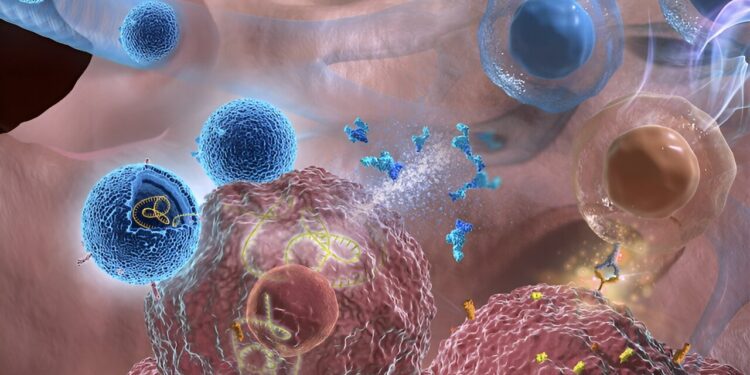Illustration showing exosomes (blue) that deliver IL-12 mRNA to lung cancer cells (brown). Credit: Cheng Lab/Columbia Engineering
Lung cancer is one of the most common cancers and has one of the lowest survival rates in the world. Cytokines, which are small signaling proteins, such as interleukin-12 (IL-12), have demonstrated considerable potential as robust tumor suppressors. However, their applications are limited due to a multitude of serious side effects.
In an article published in Nature Nanotechnology, biomedical engineering professor Ke Cheng and his research group demonstrated that the use of nanobubbles, called exosomes, via an inhalation treatment method, can directly deliver IL-12 messenger RNA (mRNA) to lungs. mRNAs are the blueprints for producing specific proteins that participate in various cellular functions.
While scientists have previously used liposomes (tiny fat-based particles) or lipid nanoparticles (LNPs) to deliver mRNA, this method has several problems, including a lack of referencing to tissues, where the particles do not go to target organs, and concerns about potential toxicity after long-term exposure. Over the past 15 years, Cheng’s group has developed exosomes for use as drug carriers superior to liposomes and LNPs in specific indications.
New approach
Until now, clinicians could only use IL-12 to treat cancer by injecting it directly into the tumor or into the bloodstream. Cheng’s lab found that having the patient (in this case, mice) inhale the IL-12 mRNA in exosomes could not only deliver locally concentrated IL-12 to the lungs , but could also fight cancer better with minimal side effects.
The inhalation method is more effective at generating higher concentrations of IL-12 where it is needed than other methods of mRNA delivery, such as the use of liposomes.
“Exosomes are usually injected systemically into the bloodstream,” Cheng said. “In this new study, we show that inhaled exosomes can effectively reach the lungs and deliver an anti-lung cancer cargo, IL-12 mRNA. This is a major step in the development of new inhalable drugs to treat lung cancer, which has one of the lowest five-year survival rates in the world. »
Transforming immune cells into powerful defenders
Inhaling nanobubbles containing the IL-12 model can jumpstart lung immune cells, transforming them into powerful defenders equipped to release substances that directly target and destroy tumor cells. Additionally, IL-12 helps these immune cells “remember” the unique characteristics of tumor cells. As a result, if the tumor tries to attack again, these knowledgeable immune cells are ready to quickly recognize and eliminate the tumor.
Additionally, these supercharged immune cells can transmit their new knowledge to other untrained immune cells throughout the body, creating an army of defenders. This means that even if tumor cells attempt to spread beyond their original location, such as the lungs, these primed immune cells can spot and eliminate them, providing a system-wide defense system. organism against cancer.
Mice that inhaled this therapy demonstrated lung tumor suppression as well as increased resistance to new tumor challenges.
This strategy stands out as a powerful IL-12 mRNA delivery system to the lung microenvironment, the researchers say, and combines simplicity and effectiveness against primary tumors and metastases. Compared to other nanoparticle controls, exosomes stimulate IL-12 expression with attenuated toxicity. And patients will likely be much happier simply inhaling the drug rather than receiving intratumoral injections.
Cheng’s group is currently working with oncologists at Columbia University Irving Medical Center to translate their findings into the clinic for the benefit of lung cancer patients.
More information:
Mengrui Liu et al, Delivery of IL-12 mRNA by inhalable extracellular vesicles to treat lung cancer and promote systemic immunity, Nature Nanotechnology (2024). DOI: 10.1038/s41565-023-01580-3
Provided by Columbia University School of Engineering and Applied Sciences
Quote: Study finds new inhalable treatment a big step forward in lung cancer research (February 15, 2024) retrieved February 15, 2024 from
This document is subject to copyright. Except for fair use for private study or research purposes, no part may be reproduced without written permission. The content is provided for information only.



